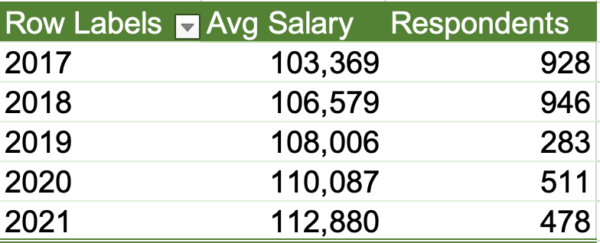We asked what you make, and 1,747 of you in 69 countries answered. Altogether, you made $171,879,034 this year. Hubba hubba, there’s some earning power in this audience.
Download the Data Professional Salary Survey results (XLSX).
A few things to know about it:
- The data is public domain. The license tab makes it clear that you can use this data for any purpose, and you don’t have to credit or mention anyone.
- The spreadsheet includes the results for all history since 2017. We’ve gradually asked different questions over time, so if a question wasn’t asked in a year, the answers are populated with Not Asked.
- The postal code field was totally optional, and may be wildly unreliable. Folks asked to be able to put in small portions of their zip code, like the leading numbers.
- Frankly, anytime you let human beings enter data directly, the data can be pretty questionable – people put in questionable units of measure for salary, and we discarded a few responses who were obvious inconsiderate trolls about their gender.
I did some quick slicing and dicing, focusing on SQL Server DBAs in the United States, and deleted the top & bottom 10 outliers (because they were kinda bananas.) Looks like DBA salaries are up again this year:

With the wildly turbulent year we just had, I was wondering if y’all would change your career goals. You said, that in 2021, your plans are to:

And that mix almost identically mirrors last year’s responses, so it looks like the pandemic didn’t change your plans too much. 2/3 of you usually plan to stay in the same company doing the same thing.
What’s the newest version of SQL Server you have in production?

The numbers are way up for SQL Server 2019 this year, up from 11% last year. That’s great! Now, on the flip side, what’s the oldest version you have in production?

Oof. About 1/3 of y’all are still supporting something that Microsoft refuses to support. You’ve got about another year and a half on SQL Server 2012, but that still means you want to start making your transition plans this year. Interestingly, the numbers for 2008 & 2008R2 didn’t drop all that much: last year, 40% of you were running those.
Hope this helps make your salary discussions with the boss a little bit more data-driven, and hope it helps justify keeping your salary competitive. If you’ve got questions about the data, go ahead and jump in – download the results in Excel. Don’t ask me to slice and dice the numbers for you – you’re a data professional, remember? Get in there and analyze it to answer your own questions. You’ve got this!


18 Comments. Leave new
I love that you’re still doing this every year, Brent. It’s really interesting to see the ancillary stuff like versions that people are running, especially. Thanks!
Thanks sir!
Thanks Brent! Useful!
In the first line of the post you say “We asked what you make, and 1,747 of you in 69 countries answered” but then in your pivot table there’s only 478 responses in 2021. Are 1,300+ records excluded for the reasons you listed later in the post?
“I did some quick slicing and dicing, focusing on SQL Server DBAs in the United States”
Sorry I’m dumb
Don’t think of it as dumb – think of it as overpaid.
I’m new to this, help me to understand:
why would we show 112,880 for 2021, if it is an average salary for 2020 ?
why would we show 110,087for 2020, if it is an average salary for 2019, and so on ?
Because it’s the survey results that we published in 2021.
Also, I can clearly remember I filled “Certifications”, “Database Servers”, “Hours Worked per Week”, but the excel file is showing “Not Asked” for my line… actually for all guys from my country, same issue in the excel file.
Can this be fixed and excel re-uploaded ?
You might be remembering previous years. We didn’t ask the certifications or hours worked questions this year. We did ask the Database Servers one, and that’s in the file.
The 2% growth by year is interesting. It’s pretty close to inflation. Maybe slightly better.
Let me guess: in Italy the average salary is 3 times less than in the US?
Sure, you can guess, and you just did. 😉
If you’re asking me to open up the data, group it by country, pick the job you’re interested in, and verify your answer – no, I am not doing that for you. That’s why I publish the data.
in Italy, excluding the top 3 and the bottom 3 , the average is 45
1.85 million USD in USA , am i way underpaid or the respondents might have done some typos ?
Way too late to this post but I’ll comment anyway – Thanks! Last years’ survey got me a larger raise. Instead of putting a number out, I’ll just say several years worth of normal raises.
Woohoo! That’s fantastic to hear! Glad we could help.